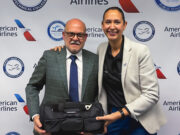
We all know how important it is to keep our bodies in shape, and just like our physical bodies, we need to keep the other areas of our lives in tip top shape as well. That's where talk therapy may come in. If you've heard about “talk therapy” before, it may have been conveyed that it is not safe or that one must be careful, or maybe it's a new idea to you. What is it, really?
Think of talk therapy like having a co-pilot for your mind. It provides a chance to chat with a non-judgmental, trained professional about anything that's on your mind. Feeling stressed about a tough landing? Worried about something going on at home? Have recurrent training coming up? Talk therapy CAN help! But it isn’t just for when things are tough. It's also a great way to stay mentally sharp and improve your overall well-being. Think of it like going to the gym for your brain.
You may be thinking, “Isn't talking to someone about the stress I am feeling bad for my medical certificate?” The fact is, taking care of your mental health is a responsibility and an important part of being a pilot. Plus, there are different types of professionals you CAN speak to without consequence or impact upon your medical.
The Federal Aviation Administration (FAA) has different rules for reporting each type on your medical application.
- Life Coaches NEVER need to be reported on your medical. Coaches are like cheerleaders for your goals, and while some of them are still professionally trained (Do your research!), they can't give diagnoses nor prescribe medications.
- Counselors are a bit different. You only need to report them if they're treating you for substance abuse or if you have received a diagnosis. Regular talk therapy with a counselor for things like stress, relationships, or family issues do not need to be reported.
- Social workers, psychologists, and substance-abuse specialists DO need to be reported.
What exactly can talk therapy do for a pilot like you? Here are a few things:
- Manage Stress: Flying can be stressful, period. Unexpected delays, inconsistent hours, relationship strains are but a few of the stressors that pilots face. Talking to a professional can assist you in developing healthy ways to deal with the pressures, such as relaxation techniques or mindset development.
- Sharpen Your Focus: Feeling foggy in the cockpit? Talking to a professional can uncover and address issues that might be affecting your concentration, for example, anxiety or sleep problems.
- Improve Communication: Sometimes, communication can be just as tricky as landing in bad weather! Talking to a professional can help you build stronger communication skills for both the cockpit and your personal life on the ground.
- Bounce Back from Challenges: Life throws everyone curveballs. Talking to a professional can equip you with tools to deal with difficult situations, both personally and professionally.
Remember, talking about your feelings isn't a sign of weakness – it's a sign of strength. Just like getting regular checkups, taking care of your mental health is an important part of being a responsible and safe pilot.
Here are some resources to help you find someone to talk to who understands the unique challenges pilots face:
- Air Line Pilots Association (ALPA) Pilot Peer Support: https://www.alpa.org/ala/pilot-assistance
- Air Line Pilots Association (ALPA) Green Campaign: https://www.alpa.org/resources/pilot-peer-support/mental-wellness/green-campaign
- Aviation Conversations (Personal Coaching for Pilots): https://www.aviationconversations.com/
- Federal Aviation Administration (FAA) Pilot Mental Fitness: https://www.faa.gov/pilot-mental-fitness
Taking care of yourself is the best thing you can do for your flying career and your overall well-being. Don’t wait if you believe a talk therapy co-pilot could help.
If you have questions or want to chat about coaching (remember, there is no need to report), you may reach me at [email protected]. We're all in this together – keeping the skies safe and ourselves healthy!

















































